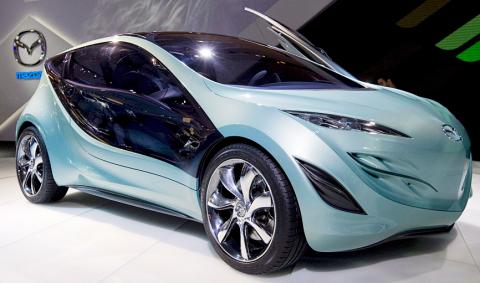Mazda Motor Corp has a creepy problem — a common spider species seems to have developed a hankering for making nests and weaving webs inside the engines of its sporty Mazda 6 sedan.
The Japanese automaker said on Thursday it would be recalling 65,000 vehicles in the US, Canada and Mexico to outfit them with special screens to keep the spiders out.
“There doesn’t seem to be any particular reason why he’s chosen the Mazda 6,” spokesman Jeremy Barnes said.

Photo: EPA
“It apparently likes to go zoom-zoom from the best we can tell,” he said with a laugh, in reference to Mazda’s advertising tag-line.
While the spider problem sounds silly, Barnes said it could be dangerous. The webs and nests can block air flow in the fuel tank’s vent and this could cause the tank to leak or even catch fire. So far there have been no accidents or fires, but Madza isn’t taking any chances.
Since the problem wasn’t restricted to a particular geographic region, Mazda thought it best to recall all its affected vehicles in areas where the yellow sac spider lives, Barnes said.
The problem was first discovered in October 2009 when a dealer found a spider web in a canister vent line when a customer brought their Mazda 6 in for repairs after it started leaking fuel.
The dealer investigated further and it was determined that the web blocked up the vent and caused “excessive vacuum” in the fuel tank, which “eventually resulted in a crack in the fuel tank through repetitive negative pressure stress,” Mazda said in filings with safety regulators.
Nineteen other spider nests have been discovered in Mazda 6 vehicles across the US, but only in the four-cylinder versions, so maybe it isn’t that sporty after all. Dealers will inspect all the vehicles for cracks, clean out the vents, install a “spring to prohibit spider intrusion” and reprogram the powertrain control module to avoid a build up of pressure in the tank.
In the latest defect recall to hit Japanese automakers, Honda Motor Co Ltd said on Thursday it was recalling almost 37,000 Civic Hybrids in the US.
Honda said a faulty converter in the hybrid control system could lead to the engine stalling and malfunction of the headlights.
No injuries or accidents have been reported in relation to the problem, which affects 2006 and 2007 models.
Chrysler Group is also recall nearly 250,000 vehicles in the US to fix an ignition key unit defect that can cause the engine to stall or shut off while driving, safety regulators reported on Thursday.
The defect affects last year’s models of the Chrysler Town & Country and Dodge Grand Caravan minivans, and Dodge Journey sport utility vehicles.

RUN IT BACK: A succesful first project working with hyperscalers to design chips encouraged MediaTek to start a second project, aiming to hit stride in 2028 MediaTek Inc (聯發科), the world’s biggest smartphone chip supplier, yesterday said it is engaging a second hyperscaler to help design artificial intelligence (AI) accelerators used in data centers following a similar project expected to generate revenue streams soon. The first AI accelerator project is to bring in US$1 billion revenue next year and several billion US dollars more in 2027, MediaTek chief executive officer Rick Tsai (蔡力行) told a virtual investor conference yesterday. The second AI accelerator project is expected to contribute to revenue beginning in 2028, Tsai said. MediaTek yesterday raised its revenue forecast for the global AI accelerator used

Taiwan Semiconductor Manufacturing Co (TSMC, 台積電) has secured three construction permits for its plan to build a state-of-the-art A14 wafer fab in Taichung, and is likely to start construction soon, the Central Taiwan Science Park Bureau said yesterday. Speaking with CNA, Wang Chun-chieh (王俊傑), deputy director general of the science park bureau, said the world’s largest contract chipmaker has received three construction permits — one to build a fab to roll out sophisticated chips, another to build a central utility plant to provide water and electricity for the facility and the other to build three office buildings. With the three permits, TSMC

TEMPORARY TRUCE: China has made concessions to ease rare earth trade controls, among others, while Washington holds fire on a 100% tariff on all Chinese goods China is effectively suspending implementation of additional export controls on rare earth metals and terminating investigations targeting US companies in the semiconductor supply chain, the White House announced. The White House on Saturday issued a fact sheet outlining some details of the trade pact agreed to earlier in the week by US President Donald Trump and Chinese President Xi Jinping (習近平) that aimed to ease tensions between the world’s two largest economies. Under the deal, China is to issue general licenses valid for exports of rare earths, gallium, germanium, antimony and graphite “for the benefit of US end users and their suppliers

Dutch chipmaker Nexperia BV’s China unit yesterday said that it had established sufficient inventories of finished goods and works-in-progress, and that its supply chain remained secure and stable after its parent halted wafer supplies. The Dutch company suspended supplies of wafers to its Chinese assembly plant a week ago, calling it “a direct consequence of the local management’s recent failure to comply with the agreed contractual payment terms,” Reuters reported on Friday last week. Its China unit called Nexperia’s suspension “unilateral” and “extremely irresponsible,” adding that the Dutch parent’s claim about contractual payment was “misleading and highly deceptive,” according to a statement